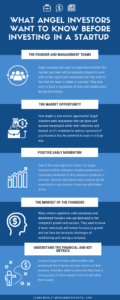Angel investors provide funding to early-stage startups in exchange for a stake in the company. They seek to replicate the high-profile investments made in companies like Airbnb, Instagram or WhatsApp. While these investors take small bets on these companies (ranging from $25,000 to $100,000 in funding), they hope for a major windfall.
Angel investors understand that startups have a high risk of failure, but ultimately they want to feel confident that the potential benefits and rewards from investing are worth the downside. They review a series of key issues and undergo due diligence before they invest in a startup. If you’re looking for an angel investor to invest in your startup, part one in our “What Angel Investors Want to Know” series offers some key issues to consider when seeking investment capital from an angel investor to help fund your startup.
The Founder and Management Teams
Many investors believe that the teams running the startup are more important than the idea surrounding the product. When prepping your founding and management teams, some topics to consider include:
- A list of founders and key team members
- A background on if team members have worked together before
- The team’s domain experience
- Key additions to the team
- The team’s unique capability to execute the business plan
- The company’s number of employees
- What motivates the founders
- Plans to scale the team within the next year
Angel investors will want to understand whether the founder and team will be enjoyable players to work with on this significant investment and they want to feel that the team is stable to succeed. They also want to build a foundation of trust and collaboration during the process. CEOs need to have experience (or at least trustworthy advisors) and the ability to listen to them and investors. Involving experienced advisors can also help in the early stages of building a team that is still growing.
The Market Opportunity
How ample is your market opportunity? Angel investors seek businesses that can grow and become meaningful within their industries and beyond, so it’s important to address questions if your business has the potential to scale in a large way. If the product or service caters to a small market, you may want to reposition the company as a platform business that allows the creation of multiple products or apps. Investors want to know the target markets and what percentage of that market you anticipate capturing over time.
Positive Early Momentum
One of the most important factors for angel investors will be indicators of early momentum or customers interested in the company’s products or services. Startups that garner early traction will be more likely to gain investor financing with better terms. Consider if you’re company has any of the following indicators of positive momentum:
- Creation of beta or minimally viable products
- Pilot customers or brand name consumers
- Strategic business partnerships
- Customer testimonials
- Emergence into competitive programs like Y Combinator or other tech accelerators/incubators
Angel investors hope to determine when early-stage momentum can be accelerated and the principal reasons for this growth. Coming up with strategies and solutions so your company can scale this transaction will be useful for everyone. Leaders should also showcase the latest press they’ve received, especially from prominent publications. Feature these headlines within your investor pitch deck and list the publications that have mentioned your company.
The Mindset of the Founders
Many venture capitalists seek passionate and determined founders who are dedicated to the company’s growth and success. They want to know if these individuals will remain focused on growth and can face the inevitable challenges of establishing and running a company. Since leading a startup is extremely hard work, investors want to know if these founders have the drive to get through the highs and the lows. Showcasing genuine commitment to the business will help drive further investment interest.
Understand the Financial and Key Metrics
Investors hope to invest with founders who understand the finances and key metrics of their business. Founders need to show that they have a strong grasp of these aspects and can articulate them clearly. Some key metrics that angel investors will want to understand include:
- Monthly burn rate of the company
- Projected growth in revenue
- Gross profit margin
- Makeup of gross revenues and gross expenses
- Lifetime value of customers
- EBITDA — Earnings before interest, taxes, depreciation, and amortization
- Customer acquisition costs
- Anticipated timeframe for the company’s profitability
- The amount of additional capital needed to be raised for future growth (and an expected timeframe)
- Additional KPIs
Check back next month for Part II in our series!


